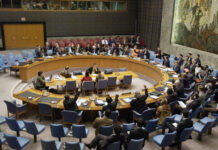Photo Credit: Global Diaspora News ( www.GlobalDiasporaNews.com).
Originally published in Inequality.org.
This March, Argentina’s school year began with empty classrooms. The price of learning materials rose by 502 percent over the past year, leaving many children unprepared for the year to come. And the teachers? On strike after President Javier Milei announced deep cuts to their salaries.
There’s something much larger happening here: Workers rights are under attack in an already vastly unequal society. Labor income inequality has been on the decline in many Latin American countries like Chile, Colombia, and Mexico. In Argentina, it’s been on the rise.
Since the 1960s, Argentina has been in an unprecedented period of macroeconomic instability. Stagnating in the lead-up to, and during, the dictatorship years (1976-1983), the country’s economy has reeled from crisis upon crisis — punctuated with the occasional period of recovery and growth. As the decades wore on, public distrust and discontent produced a deep social divide. Argentines call this phenomenon la grieta (“the rift”).
During his successful presidential bid last year, Milei seized upon these conditions. TV personality and self-proclaimed anarcho-capitalist, the eccentric economist promised to correct Argentina’s path and make what he called the “political caste” pay for their mismanagement of the country. Wielding a chainsaw while he campaigned, Milei vowed to eliminate state ministries, abolish the central bank, roll back abortion rights, and dollarize the economy.
Now that he’s had a chance to implement his platform, working families — not an elite “political caste” — are footing the bill for his far-right economic project.
In the two months before Milei took office in December, inflation was running between 143 and 161 percent. In February, inflation soared to more than 254 percent and the poverty rate reached 57 percent — the highest in decades.
Argentina’s labor movement has quickly mobilized widespread and effective opposition to his policies. While strikes and protests continue, we can already begin to draw lessons on resisting the far-right’s rise worldwide.
Milei Takes a Chainsaw to Workers Rights
After taking office on December 10, 2023, Milei acted swiftly. Declaring “There is no alternative to shock,” the president immediately devalued the peso by 50 percent, lifted price controls, and dissolved half of the country’s ministries.
Milei’s government then launched an offensive on workers rights. On December 14, the newly appointed Minister of Security announced a new protest protocol. Consolidating control of Argentina’s security forces and creating a registry for organizations suspected of “instigating” the protocol allowed federal forces to use increased surveillance and violence.
Days later, Milei signed the “Decree of Necessity and Urgency 70/2023.” Dubbed the megadecreto (“mega-decree”) for its sweeping scope — cutting severance pay, weakening collective bargaining rights, deregulating the rental market, and otherwise undermining existing protections — the 366-article document is an unconstitutional abuse of executive powers.Making matters worse, Milei cut public subsidies on utilities and transportation. Hypocrisy shone through his already vague definition of the “political caste.” As one Argentine told a journalist, “The caste doesn’t take the train nor any form of public transit. We workers and students do.”
Milei’s aggressive measures roused a prompt response from Argentine labor. In late December, the country’s largest unions announced plans for a January 24 general strike — the quickest to be organized under any president since Argentina’s return to democracy in 1983.
Millions Join the General Strike
Forty-five days after Milei took office, 1.5 million Argentines took to the streets. Workers from all sectors joined the strike: transit, aviation, government, banking, and sanitation, just to name a few.
“Not one step back,” one associated union declared on the day of the strike, “for the unity of the workers movement is essential in protecting the rights we’ve achieved.”
The protesters’ outrage centered on Milei’s Omnibus Bill. The proposed legislation contained sweeping changes to Argentina’s economic and political structure, including the privatization of state-owned companies and an unprecedented expansion of executive powers.
The bill would also codify Milei’s unpopular “mega-decree.”
“[Milei’s ‘mega-decree’] destroys individual rights of workers, collective rights and seeks to eliminate the possibility of union action at a time in which we have great inequality in society” said Héctor Daer, the Secretary General of the General Confederation of Labor. One of the world’s largest unions, the CGT represents roughly two-thirds of Argentina’s unionized workforce.
Source of original article: Liam Crisan / Foreign Policy In Focus (fpif.org).
The content of this article does not necessarily reflect the views or opinion of Global Diaspora News (www.GlobalDiasporaNews.com).
To submit your press release: (https://www.GlobalDiasporaNews.com/pr).
To advertise on Global Diaspora News: (www.GlobalDiasporaNews.com/ads).
Sign up to Global Diaspora News newsletter (https://www.GlobalDiasporaNews.com/newsletter/) to start receiving updates and opportunities directly in your email inbox for free.

































